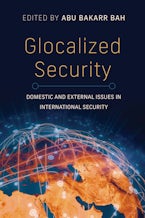"Glocalized Security is a compelling volume with many fascinating perspectives on the most urgent security challenges of our time—from Afghanistan, Azerbaijan, and Nepal to Iraq, Somalia, and Nigeria. By examining how domestic and external issues and interests complicate and exacerbate conflicts, Abu Bakarr Bah and the contributors provide pathways for understanding the peculiar and complex nature of these challenges, disentangling the fusion, and, therefore, creating the conditions for security and peacebuilding. This book is a critical contribution to the sociology of international peace and security."—Wale Adebanwi, Presidential Penn Compact Professor of Africana Studies, University of Pennsylvania
"The sociology of international peace and security has been critical to scholarship since the days of Karl Polanyi but remains sorely underutilized as prism to make sense of both global and local challenges in analyzing conflicts as well as preventing and mitigating them. This volume by Abu Bakarr Bah and contributing authors is full of nuance, theoretical explorations and cross-regional insights that will be of use to a wide variety of scholars around the world."—Harry Verhoeven, Convenor of the Oxford University China-Africa Network
"Analyzing glocalized security (through exploring the domestic and global drivers of conflicts), this edited volume greatly adds to our knowledge twofold: theoretically by adding a sociological perspective and empirically through a wide range of case studies that span the globe. Together with its diverse authorship, the book exemplifies Global IR."—Martin Welz, University of the Bundeswehr Munich, Germany
"In an academic world still marked by over-specialization and compartmentalization, Glocalized Security stands out as a refreshing contribution. This book brings sociology into conversation with international peace and security, as well as area studies. In doing so, it sheds light on the intersection of global and local factors from novel, non-Western perspectives, challenging the liberal security paradigm and offering potential pathways for peaceful solutions to glocal crises. Firmly grounding empirical analysis within a solid theoretical and analytical framework, Abu Bakarr Bah has successfully brought together a diverse team of emerging and established scholars. Together, they follow his endeavour to challenge orthodoxies in international security studies by applying a glocal lens to conflicts in Africa, Asia, and Europe. This book will undoubtedly appeal to anyone seeking a fresh, interdisciplinary, and non-Western take on conflicts around the world."—Marco Wyss, Lancaster University
"Glocalized Security is a must-read for scholars and policymakers engaged in international and regional security issues. Abu Bakarr Bah and his colleagues provide a rich concept of international security and a nuanced understanding of the nature and drivers of violent conflicts. Through the paradigm of glocalized security, they examine the domestic and external drivers of conflicts, and more importantly show how the fusion of domestic and external factors transform the nature of conflicts. The work is not only conceptually rich, but also provide a wide range of insightful cases from Europe, Africa, and Asia. The cases provide rich analysis of widely covered conflicts such as in Ukraine, Afghanistan, and Iraq as well as less-known cases, such as in Nagorno-Karabakh, Nigeria, and Somalia. The depth of the analysis is insightful and opens a path to the sociology of international security."—Alhaji Sarjoh Bah, Director of Conflict Management, African Union Commission
"Examining security from an international perspective is one thing. It is another thing to do so from a "glocalized" purview – "where the local is globalized and the global is localized," writes the book's editor, Abu Bah. Deviating from the standard political science-centric, institutionalist analysis of interstate, regional, and global security complex frameworks to understand the contemporary state of conflict in the world, Bah's sociological examination reveals distinctive insights about the roles that geopolitics and external intervention play in fueling wars in the most localized communities of some countries while transforming their politics and societies into "glocal" security domains where local and global actors compete for influence. The edited volume is a refreshing perspective on war for the international security studies reader."—Rita Edozie, University of Massachusetts-Boston

